One of the most prominent festivals of the Islamic community, Eid ul-Fitr or Eid al-Fitr is celebrated widely all over the globe. On this day, the holy month of Ramadan i.e., a month-long-period of fasting comes to an end for the Muslim community. The festival falls on the first day of the tenth month of the Islamic calendar i.e., Shawwal which is observed when the moon of that day is sighted.
Also known as ‘Meethi Eid’, it is celebrated by distributing home-made sweet, ‘Seviyan’, prepared with vermicelli dipped in sweetened milk and dry-fruits. In 2024, Eid ul-Fitr will be observed from the evening of the 10th April (Wednesday) till the sunset of 11th April (Thursday).
(Dates may vary depending on the position of the moon).
Eid ul-Fitr History and Significance
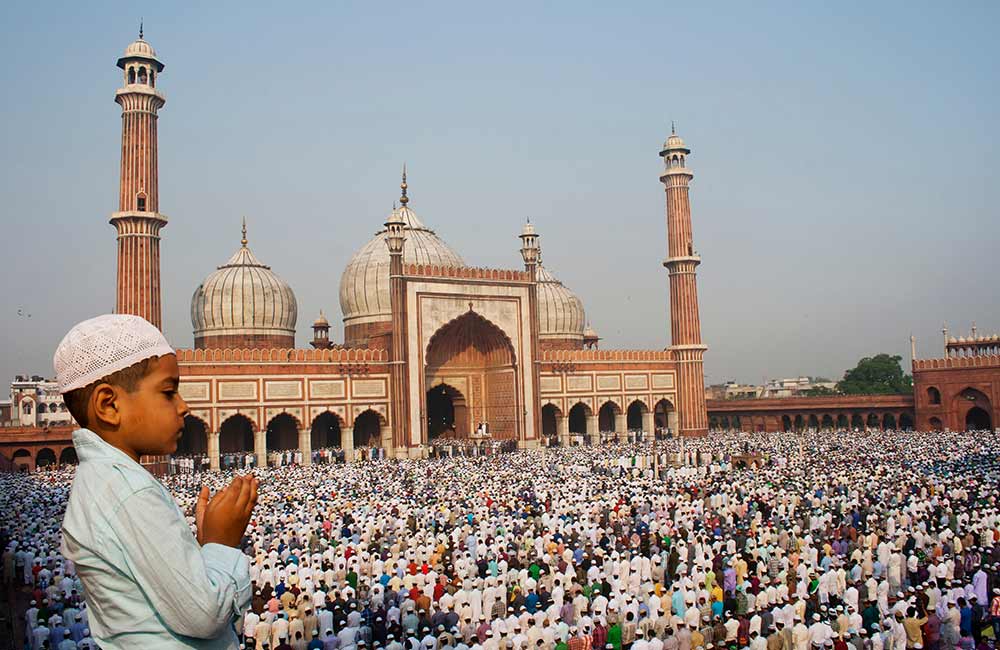
Eid ul-Fitr 2024 | Eid ul-Fitr History
Eid ul-Fitr or ‘Sweet Eid’ was originated by Prophet Muhammad and is being celebrated by the Muslim community for many centuries. The day is observed as the first day of the month of Shawwal which comes right after the conclusion of Ramadan i.e., the ninth month of the Islamic calendar. The fast of Ramadan (Ramazan) expresses the basic values of the Islamic community including empathy for the poor, charity, worship, steadfastness and patience; it comes to an end on ‘Meethi Eid’.
According to the Islamic calendar, Eid ul-Fitr begins when the first ray of light from the crescent moon of the first day of Shawwal falls on the ground. And if the moon is not sighted due to weather conditions issues then Eid is observed on the following day.
Ways to Celebrate Eid al-Fitr
Eid al-Fitr is a significant festival for Muslims worldwide, marking the end of the holy month of Ramadan. There are numerous ways to celebrate this pious festival with friends and family.
Start with Eid Prayers
Eid al-Fitr celebrations commence with Eid prayers in the morning, typically held at mosques or open grounds. It’s essential to begin your day by thanking Allah for his blessings and seeking forgiveness. Don’t forget to wear new clothes and apply perfume before heading to the mosque.
Share the Joy with Family and Friends
Eid al-Fitr is a time to spread joy and happiness with your loved ones. You can plan a family get-together, invite friends over, and enjoy a feast together. Sharing food, sweets, and gifts with each other is a significant part of the celebrations.
Indulge in Festive Delights
No Eid celebration is complete without feasting on delicious food. Prepare traditional dishes such as biryani, kebabs, haleem, and sheer khurma to mark the occasion. Make sure to include sweet treats like sevaiyan, gulab jamun, and ras malai. Don’t forget to share the food with your neighbours and less fortunate people.
Give to the Needy
Eid al-Fitr is also a time to give to those in need. Donate clothes, money, and food to the poor and underprivileged. This gesture of kindness will make them feel loved and cared for and add more meaning to your celebrations.
Spread the Spirit of Eid
Eid al-Fitr is a time to spread love and happiness. Greet everyone with the traditional Eid Mubarak, which means “Blessed Eid” and exchange gifts with your friends and family. Decorate your house with colourful lights, balloons, and flowers to give it a festive look.
Eid ul-Fitr Celebrations across India
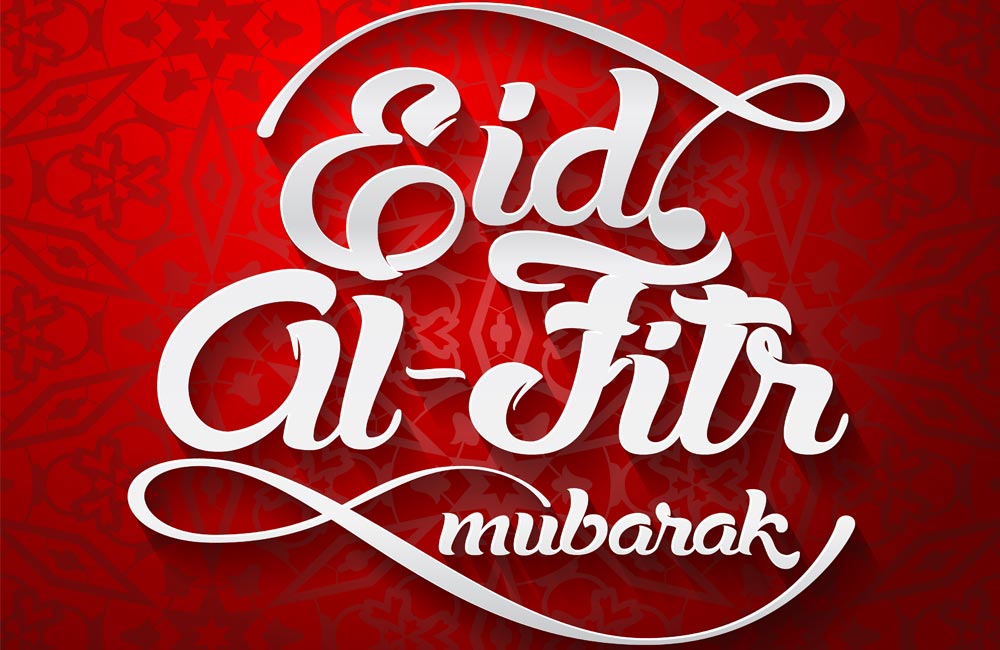
Eid ul-Fitr 2024 | Eid ul-Fitr Celebrations
On this day, Muslims wear new clothes and visit mosques for offering their prayers to Allah. They recite a particular religious prayer known as salat, on this day. Muslims prepare exotic sweets such as ‘Seviyan’ and organize grand get-togethers at their residences.
Traditional Food for Eid al-Fitr 2024
Eid al-Fitr is a time for celebration, so it’s only natural that the foods associated with this holiday are sweet and delicious. Sweets and desserts are a must-have on Eid al-Fitr menus, whether they’re served as part of an elaborate meal or eaten as snacks throughout the day.
Main dishes tend to be simple but filling: meaty stews made with lamb or chicken; vegetable dishes like okra stewed in tomato sauce; rice pilafs topped with nuts or raisins; and stuffed vegetables such as eggplant caviar.
Snacks include fruit salads (usually consisting of grapes, melon balls and pomegranate seeds), nuts dipped in honey syrup or sugar syrup (known as “qamar el-din”), dates stuffed with almond paste (known as “makloubeh”).
Popular Sweets and Desserts
The most popular sweets and desserts are Gulab Jamun, Kheer and Sheer Khurma.
Gulab Jamun is a deep fried milk dumpling which is soaked in sugar syrup and served chilled. It’s usually made from khoya (milk solids) or paneer (cottage cheese), flour and cardamom powder.
Kheer is a sweet dish made with rice cooked in milk with nuts like almonds or pistachios added to it. This can be eaten cold as well as hot depending on the weather conditions of your country during this time of year!
Sheer Khurma is another delicious dessert prepared using vermicelli noodles cooked in saffron flavored milk along with dry fruits such as raisins, cashews etc., garnished with pistachios on top!
Popular Main Dishes
Biriyani: A traditional rice dish that’s often served at weddings and other celebrations, biriyani is made with spices like cinnamon and cardamom. The word “biriyani” comes from a Persian word meaning “fried before cooking.”
Haleem: This hearty stew contains wheat or barley grains and lentils, as well as meat such as lamb or beef (or both). It’s traditionally eaten during Ramadan to break your fast at sunset. According to legend, haleem was created by an Indian king who wanted to feed his people after fasting all day–and it became so popular that it spread throughout the country!
Popular Snacks
The food of Eid al-Fitr is rich and diverse, but there are some dishes that stand out as being especially popular. One such dish is samosas, which are fried pastries stuffed with meat or vegetables. They are often served with chutney sauce on the side for dipping.
Another favorite snack is pakoras, which are deep-fried vegetable fritters served with chutneys or ketchup for dipping. Pakoras can be made from any number of different vegetables (or sometimes fruits), including carrots, cauliflower and potatoes–but they’re most commonly made from chickpea flour batter mixed with spices like coriander seeds or cumin seeds before being dipped in hot oil until crispy brown on both sides!
Best Places to Observe Eid ul-Fitr Celebrations across India
- Lucknow
- Delhi
- Agra
- Hyderabad
- Mumbai
- Bangalore
- Srinagar
Year-Wise Eid ul-Fitr Observances
| YEAR | DAY | DATE | EVENT/FESTIVAL |
| 2015 | Sat | 18-Jul | Eid-al-Fitr |
| 2016 | Thur | 7-Jul | Eid-al-Fitr |
| 2017 | Sun | 25-Jun | Eid-al-Fitr |
| 2018 | Fri | 15-Jun | Eid-al-Fitr |
| 2019 | Wed | 5-Jun | Eid-al-Fitr |
| 2020 | Sun | 24-May | Eid-al-Fitr |
| 2021 | Thur | 13-May | Eid-al-Fitr |
| 2022 | Tue | 3-May | Eid-al-Fitr |
| 2023 | Sat | 22-Apr | Eid-al-Fitr |
| 2024 | Thur | 11-Apr | Eid-al-Fitr |
| 2025 | Mon | 31-Mar | Eid-al-Fitr |
Other Festivals in India with Holiday Type
| Festivals in India | Day | Date | Holiday Type |
|---|---|---|---|
| New Year’s Day | Mon | 01-Jan | Restricted Holiday |
| Lohri | Sat | 13-Jan | Restricted Holiday |
| Makar Sankranti | Sun | 14-Jan | Restricted Holiday |
| Pongal | Mon | 15-Jan | Restricted Holiday |
| Guru Gobind Singh Jayanti | Wed | 17-Jan | Restricted Holiday |
| Republic Day | Fri | 26-Jan | Gazetted Holiday |
| Losar | Sat | 10-Feb | Restricted Holiday |
| Basant Panchmi | Wed | 14-Feb | Restricted Holiday |
| Guru Ravidas Jayanti | Sat | 24-Feb | Gazetted Holiday |
| Maharshi Dayanand Saraswati Jayanti | Wed | 6-Mar | Restricted Holiday |
| Mahashivratri | Fri | 8-Mar | Gazetted Holiday |
| Holi | Mon | 25-March | Gazetted Holiday |
| Good Friday | Fri | 29-Mar | Gazetted Holiday |
| Easter Day | Sun | 31-Mar | Restricted Holiday |
| Gudi Padwa | Tue | 9-Apr | Restricted Holiday |
| Eid-ul-Fitr | Wed | 10-Apr | Gazetted Holiday |
| Vaisakhi (Vishu) | Sat | 13-Apr | Restricted Holiday |
| Rama Navami | Wed | 17-Apr | Gazetted Holiday |
| Mahavir Jayanti | Sun | 21-Apr | Gazetted Holiday |
| Rabindra Jayanti | Wed | 8-May | Restricted Holiday |
| Buddha Purnima (Vesak) | Thu | 23-May | Gazetted Holiday |
| Id-ul-Zuha (Bakrid) | Mon | 17-Jun | Restricted Holiday |
| Rath Yatra | Sun | 7-Jul | Gazetted Holiday |
| Muharram (Ashura) | Wed | 17-Jul | Gazetted Holiday |
| Independence Day | Thu | 15-Aug | Gazetted Holiday |
| Parsi New Year’s Day (Nauraz) | Thu | 15-Aug | Public Holiday |
| Raksha Bandhan (Rakhi) | Mon | 19-Aug | Restricted Holiday |
| Janmashtami | Mon | 26-Aug | Restricted Holiday |
| Ganesh Chaturthi | Sat | 7-Sep | Restricted Holiday |
| Onam | Sun | 15-Sep | Restricted Holiday |
| Milad-un-Nabi or Id-e- Milad | Mon | 16-Sep | Gazetted Holiday |
| Gandhi Jayanti | Wed | 02-Oct | Gazetted Holiday |
| Dussehra | Sat | 12-Oct | Gazetted Holiday |
| Valmiki Jayanti | Thu | 17-Oct | Restricted Holiday |
| Karva Chauth | Sun | 20-Oct | Gazetted Holiday |
| Dhanteras | Tue | 29-Oct | Restricted Holiday |
| Kali Puja | Thu | 31-Oct | Gazetted Holiday |
| Halloween Day | Thu | 31-Oct | No Holiday |
| Diwali | Fri | 1-Nov | Gazetted Holiday |
| Lakshmi Puja | Fri | 1-Nov | Gazetted Holiday |
| Karnataka Rajyotsava | Fri | 1-Nov | Gazetted Holiday |
| Kerala Piravi | Fri | 1-Nov | Gazetted Holiday |
| Govardhan Puja | Sat | 2-Nov | Gazetted Holiday |
| Bhai Dooj | Sun | 3-Nov | Gazetted Holiday |
| Chhath Puja | Thu | 7-Nov | Gazetted Holiday |
| Guru Nanak Jayanti | Fri | 15-Nov | Gazetted Holiday |
| Christmas | Wed | 25-Dec | Public Holiday |
Frequently Asked Questions
Q. What is Eid ul Fitr 2024 and when is it celebrated?
A. Eid ul Fitr 2024 is a Muslim festival that marks the end of the holy month of Ramadan. It is celebrated on the first day of the Islamic month of Shawwal. In 2024, Eid ul Fitr is expected to be celebrated on Tuesday, April 9, 2024, subject to the sighting of the moon.
Q. When is the Eid 2024 date in India?
A. The Eid 2024 date in India is expected to be on Tuesday, April 9, 2024, subject to the sighting of the moon. The date may vary by a day depending on the sighting of the moon.
Q. How is Eid ul Fitr 2024 celebrated?
A. Eid ul Fitr 2024 is celebrated by Muslims across the world with great enthusiasm and joy. People dress up in new clothes, offer special prayers in mosques, exchange greetings and gifts with family and friends, and prepare delicious food. It is a time of forgiveness, generosity, and compassion.
Q. What does “Eid Mubarak” mean?
A. “Eid Mubarak” is a common greeting used during the Eid ul Fitr festival. It means “Blessed Eid” or “Happy Eid” and is a way of wishing someone well during the holiday.
Q. Can non-Muslims participate in Eid ul Fitr celebrations?
A. Yes, non-Muslims are welcome to participate in Eid ul Fitr celebrations, as it is a time of joy and inclusivity. It is a chance to learn about and appreciate Muslim culture and customs.
Q. How can I wish someone a happy Eid ul Fitr?
A. You can wish someone a happy Eid ul Fitr by saying “Eid Mubarak” or “Happy Eid.” You can also send a greeting card, a message or a gift to show your appreciation for the occasion.


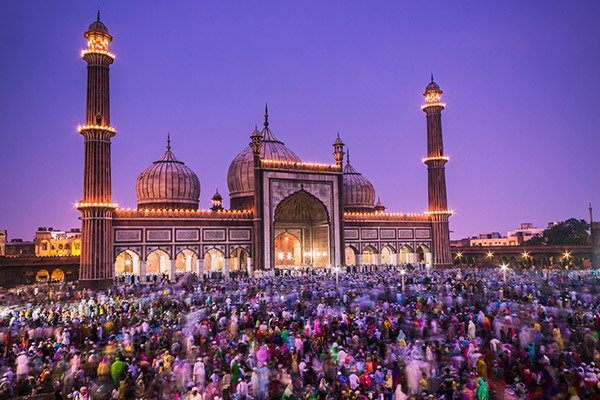
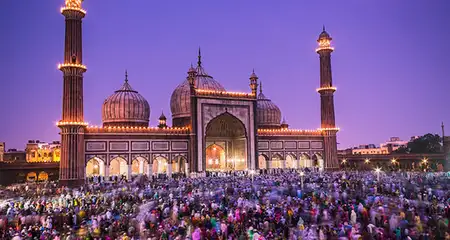



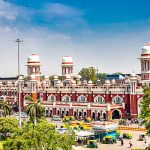 How to Reach Lucknow by Flight, Train, Car or Bus
How to Reach Lucknow by Flight, Train, Car or Bus 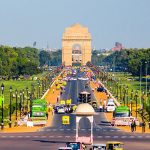 How to Reach Delhi by Flight, Train, Car or Bus
How to Reach Delhi by Flight, Train, Car or Bus  How to Reach Hyderabad by Flight, Train, Car or Bus
How to Reach Hyderabad by Flight, Train, Car or Bus  How to Reach Mumbai by Flight, Train, Car or Bus
How to Reach Mumbai by Flight, Train, Car or Bus  How to Reach Bangalore by Flight, Train, Car or Bus
How to Reach Bangalore by Flight, Train, Car or Bus 




